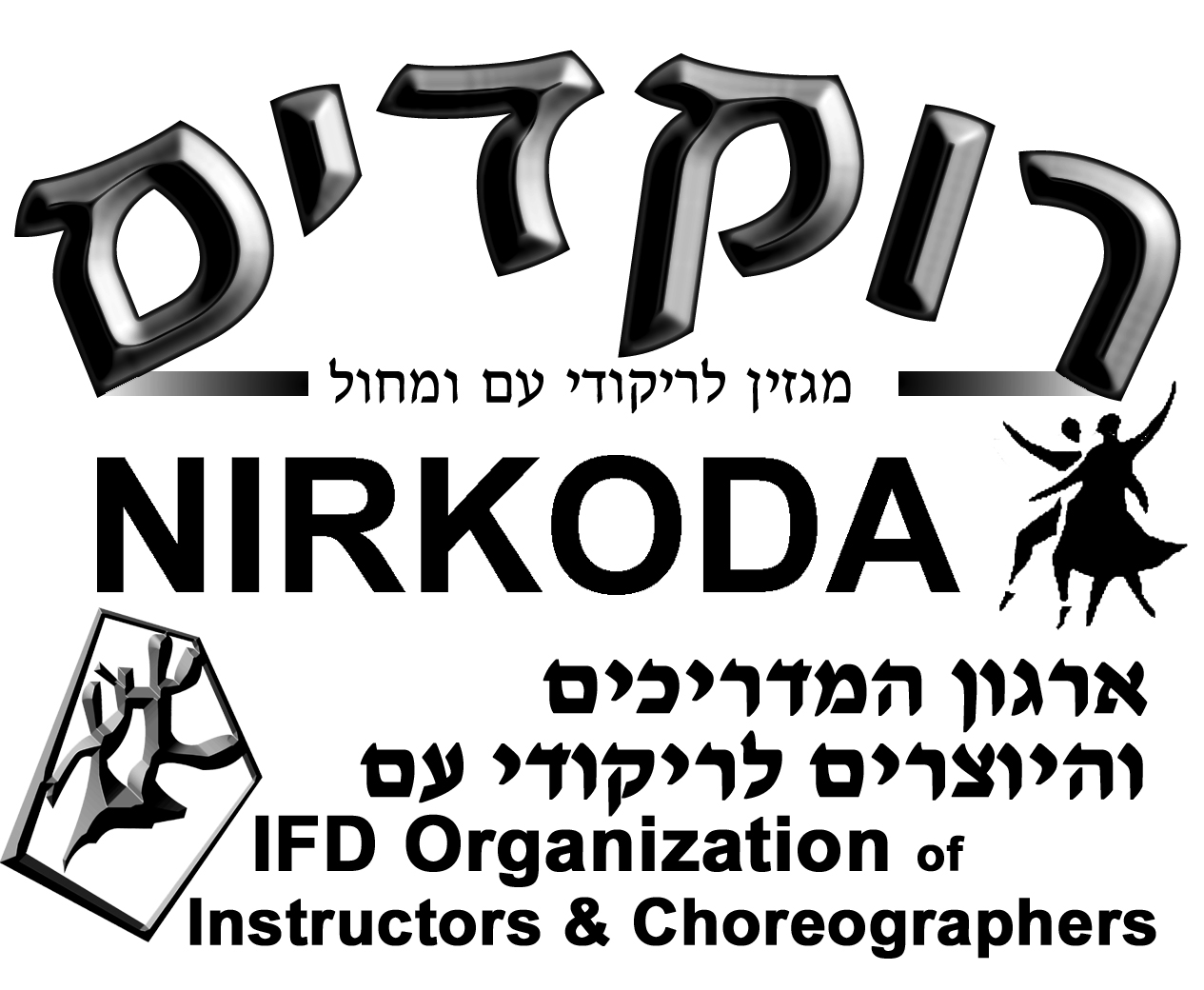- Home
- Rokdim Nirkoda 114
- Mechakot (Waiting) – HaBalada LaMechakot
Michael Barzilai, 35, lives in Or Akiva and is the father of 6-year-old Danielle. He started to dance at the age of 8 with Itzik Ben Ami in Kiryat Haim, following in the footsteps of his mother, who danced there.
As a child he also danced with Dede Lusky, Yossi Peretz and Chanan Dadon. Already at age 13 he started to learn how to edit music and especially music for dance. He was encouraged and guided by Dede Lusky.
He continued to dance as he grew older, during his high school years and his military service as well as during the time of his academic studies. During his military service he substituted for various instructors at different dance sessions, and after that, in 2010, he experimented with professional dance for a year – while he worked with Elad Perel at the Technion dance session in Haifa.
Later on, he had the opportunity to collaborate with well-known choreographers such as Yaron Carmel, Ohad Atia and others. As a dancer, he always enjoyed the challenge of folk dancing, always wanted to learn more dances and more styles. Even now Michael travels at every opportunity to marathons and dance festivals, in order to dance a broad variety of dances.
He choreographed his first dance in 2015 to the song “Ima – Mother”, originally by Nisim Sarusi and then updated by Harel Moyal. The dance is called “Ima Sheli – My Mother”: https://bit.ly/3SCzL4l.
In the summer of 2015, at the initiative and with the support of two friends, Chen Shporen and Ohad Atia, Michael traveled for the first time to teach his dances and those of other choreographers at Gvanim Camp in the United States. While there he taught the dance “La Trompeta”, to trumpet music played by the Israeli trumpeter Arik Davidov.
Since then Michael has choreographed many dances which are danced in Israel and around the world. His dances can be found on the Rokdim website: https://bit.ly/3UairES.
The last dance taught in Israel and abroad is “Mechakot – Waiting”, words and music by Tslil Kalifi, Mor Sasson and Narkis Reuven.
The song, whose original name is “Ballad for Women who Wait”, is sung by the songstress Narkis (Narkis Reuven).
About the Dance:
The background to the choreography of this dance is very special: On the 7th of October, 2023 a catastrophe happened here. The mass terror attack by Hamas from Gaza hit the Gaza Envelope settlements and the Nova Festival; many children, youth and adults were murdered. Among those murdered was Yaniv Sarudi z”l, brother of Nofar Sarudi, a close friend of mine, who dances at our dance sessions. Nofar requested that her brother Yaniv’s death should be commemorated with a dance, so that she could have a personal memory of him – the world of dance that she so loves.
I was happy to fulfill her request and searched for a suitable song. I sent Nofar several possible songs that seemed right to use for a dance, and she finally chose “HaBalada LaMechakot – The Ballad for the Women Who Are Waiting”. It completely filled the way she felt, and this is what she chose.
The song was registered to my good friend Sharon Elkaslassy (who introduced this song to me) and he agreed to release the song so that we could choreograph a dance in memory of Yaniv.
The dance was debuted 30 days after the horrific attack and was immediately taught at dance sessions taught at dance sessions in Israel and all over the world. Many dancers and instructors wrote to me to say how much dance, as well as the song, touched them, and helped them return to dancing because it became a bridge between the world of dance and the memory of the terrible massacre. These reactions touched me emotionally and made me feel at peace with creating a dance in a period that wasn’t in the least trivial.
As always, I tried to create a connection between the steps of the dance and the words of the song. For example: In the first part: “Good night to all those waiting for the light of the moon” / “Put your head down but there’s no one to lean on” – in the dance we do a “balance” step when we lower our heads, as an expression of waiting, or perhaps leaning. This is immediately followed by looking up and waving an arm toward “the light of the moon”.
In part 2: moving from side to side and swinging hands, to express searching and yearning for the return of the loved one for whom we wait.
In part 3: “I fell to the sky, I couldn’t go up” – you go down and then you slowly climb upward.
And at the end of part 3, you place your left hand on your heart, then you turn left and throw out your arm and finally both hands return to the heart. This ending expresses the search of the speaker’s heart and all of us as well for comfort and warmth following our loss.
Video of the dance: https://bit.ly/4b7mJmr
Mechakot – Dance Notation
Meter: 4/4
Formation: Circle
Part A Face CCW
1-2 Step R fwd, touch L toes next to R.
3-4 Step L fwd, touch R toes next to L and pivot on L to left to end facing center.
5-8 Moving CCW: Step R to rt. side, L behind R, R to rt. side, L across R.
9-12 Step R to rt. side, hold, step L behind R facing slightly to the left (CW) and bending fwd, step R fwd (CW).
13-16 Step L fwd while straightening the body, hold, step R fwd while raising rt. arm upward, step back in place on L pivoting rt. to end facing CCW.
17-32 Repeat counts 1-16 (Part A) but end facing center.
Transition Face Center
1-4 Yem. R and pivot rt. to face CCW.
5-8 Three steps fwd on the line of the circle: L,R,L.
9-16 Repeat counts 1-8 (Transition).
Part B Face Center
1-4 Starting with R, open mayim on line of the circle: side, behind, side in front.
5-8 Step R to rt. while raising arms to rt., hold, turn to the left with L,R moving left on the line of the circle.
9-16 Repeat counts 1-8 with opposite footwork and direction.
17-20 Moving toward center of the circle: Step R fwd and face CCW, brush L to left toward center, step L to left, R behind left.
21-24 Step L to left and pivot left to face CW, brush R to rt. toward center, step R to rt., L behind R and face center.
25-28 Step R fwd, L fwd while bending fwd, step R bwd while straightening body, hold.
29-32 Three steps bwd toward the line of the circle: L,R,L, hold.
33-64 Repeat counts 1-32 (Part B).
Part C Face Center
1-4 Three steps moving in an arc on the line of the circle to end facing out: R,L,R. Hold.
5-8 Tcherkessia step rocking fwd and bwd on R while bending fwd: R fwd, L bwd in place, R bwd, L fwd in place.
9-12 Straighten body and move in an arc out of center and to the left to end facing center with three steps: L,R,L. Hold.
13-16 Moving toward center with three steps fwd: R,L,R while moving arms in a circular motion upward, hold.
17-20 Yem. L while placing left hand on chest.
21-24 Moving out of center with three steps bwd: R,L,R. Hold.
25-28 Turn left with three steps: L,R,L while extending left hand to left and end facing center.
29-32 Step R to rt. opening rt. arm to rt. side, step L in place, close R to L while bringing hands together (rt. palm over left) on chest at heart.
33-64 Repeat counts 1-32 (Part C).
Instructions notated by Honey Goldfein
HaBalada LaMechakot – The Ballad for the Women Who Are Waiting
Music: Tslil Kalifi, Mor Sasson
Lyrics: Narkis Reuven, Tslil Kalifi, Mor Sasson
Singer: Narkis Reuven
Transliteration:
Laila Tov Lekol hamechkot le’or yare’ach
Chalomot tovim ve’lo li’dog, ze yavo
Hayayin meshaker li
Ose li lekavot
Veshuv lo hayita badelet
Veshuv hitarganti sha’ot
Hayita sho’el oti, ma balev sheli, ma balev sheli hayom
Ve’eich lo rartzita lishmo’a
Ve’ecih lo ratzita lir’ot
Ma balev sheli, ma balev sheli, ma bo’er etzli betoch
Laila tov lekol mi she’kamoni lo nirdemet
Sama et ha’rosh ve’ein al mi le’hisha’en
Tagid li ma yihiye iti
Ma yihiye basof
Veshuv lo hayita badelet
Veshuv hitarganti sha’ot
Hayita sho’el oti, ma balev sheli, ma balev sheli hayom
Ve’eich lo rartzita lishmo’a
Ve’ecih lo ratzita lir’ot
Ma balev sheli, ma balev sheli, ma bo’er etzli betoch
Nafalti lashamayim lo hitzlachti la’alot
Im ata me’ir ta’dma’ot sheli
Lama be’sha’a kazot?
Atzamti ta’einayim vebikashti ba’tfilot
Hayita sho’el oti, ma balev sheli, ma balev sheli hayom
Hayita sho’el oti, ma balev sheli, ma balev sheli hayom
Translation
Good night to all those waiting in the moonlight
Good dreams and do not worry, it will come
The wine lies to me
Makes me hope…
And again, you weren’t at the door
And again, I prepared myself for hours
You would ask me, “What’s in my heart? What’s in my heart today?”
And how you didn’t want to hear
And how you didn’t want to see
What’s in my heart, what’s in my heart, what’s burning inside me
Good night to everyone who, like me, doesn’t fall asleep
Put my head down and there’s no one to lean on
Tell me what will happen to me
What will happen in the end?
And again, you weren’t at the door
And again, I prepared myself for hours
You would ask me, “What’s in my heart? What’s in my heart today?”
And how you didn’t want to hear
And how you didn’t want to see
What’s in my heart, what’s in my heart, what’s burning inside me?
I fell to the sky, I couldn’t rise up
If you wake my tears, why at this hour?
I closed my eyes and asked in prayers
You would ask me, “What’s in my heart? What’s in my heart today?”
You would ask me, “What’s in my heart? What’s in my heart today?”
Lyrics transliterated and translated by Ruth Goodman and Benny Levy









Comments
התראות